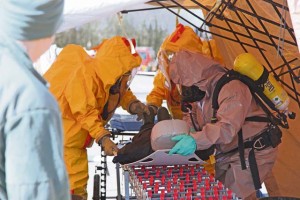ZAVENTEM, Belgium — As local radio announcers provided hourly updates on President Barack Obama’s visit to Belgium March 26, Soldiers from the 7th Civil Support Command’s 773rd Civil Support Team trained for possible future international crises.
The 773rd CST Soldiers partnered with the Zaventem Fire Department during the fifth annual Chemical, Biological, Radiological and Nuclear training exercise, known as CBRN Week, March 24 to 28.

During five days of joint training, more than 17 773rd CST Soldiers and approximately a dozen local firefighters tested their joint CBRN response techniques in a variety of scenarios.
“My intention was to put different scenarios together to test training with different departments to work together and manage a HAZMAT scenario,” said 2nd Lt. Toralf Deick, exercise observer controller and volunteer emergency responder with the Zaventem Fire Department. “Good to figure out how good you are and what you need to improve.”
Deick planned and coordinated the different training sites based on his past experiences with the Zaventem Fire Department and from his full-time job as a firefighter with the local Vilvoorde Fire Department.
One of Deick’s ideas was a joint Zaventem Fire Department and 773rd CST team reacting to a possible radiological and chemical spill caused by a simulated multiple vehicle accident involving a van possibly carrying hazardous material, as well as simulated victims trapped in the wreckage.
The Soldiers’ and firefighters’ bulky protective suits and equipment turn the simple act of sample testing, monitoring, climbing a ladder or treating a possibly contaminated patient into an extremely difficult physical challenge.
“Training is going great,” Sgt. Maj. Stef Vandersmissen, Zaventem FD firefighter. “(It is) interesting to see my guys doing their normal duties in a different circumstance for them. The integration with the (773rd) CST is very good.”
“Every time we come up here it is a different type of training with a different type of scenario,” said Cpl. Eric Song, survey team member, 773rd CST. “(The training) gives us different points of view on how to look at certain incidences. They’re very proficient. They’re first responders, so their priorities are (extraction and) saving lives.”
Song said the 773rd CST’s main function is to quarantine, assess, monitor and mitigate a potential CBRN incident that may affect the surrounding population.
Also, during the second day of training in a field outside of town, the firefighters and the 773rd CST CBRN team worked together to decontaminate and triage possible survivors.
“That was unique,” said Army Staff Sgt. Jessica Searcy, administrative NCO, 773rd CST. “Normally we only deal with our 22 (person) team.”
Mid-week the firefighters and 773rd CST attended a military congress workshop where they listened to instructional speeches and participated in discussions with leading CBRN experts from the Belgian military.
“This is one of my favorite annual training events that I look forward to, (every year),” Song said.
The fourth day had the 773rd CST Soldiers cut open several vehicles using the Jaws of life after the vehicles’ air bags deployed.
The closing ceremony on the fifth day included the laying of a wreath at a memorial for a fallen Zaventem Fire Department firefighter, who had recently died in the line of duty.
“It is always good to work with different nations, because we’re in foreign consequence management,” said Army Staff Sgt. John Gribble, survey team NCO, 773rd CST.


